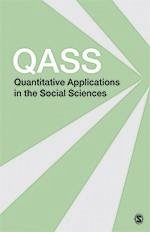Nicht lieferbar

Linear Probability Logit & Probit Models
Versandkostenfrei!
Nicht lieferbar
Ordinary regression analysis is not appropriate for investigating dichotomous or otherwise `limited' dependent variables, but this volume examines three techniques -- linear probability, probit, and logit models -- which are well-suited for such data. It reviews the linear probability model and discusses alternative specifications of non-linear models. Using detailed examples, Aldrich and Nelson point out the differences among linear, logit, and probit models, and explain the assumptions associated with each.



